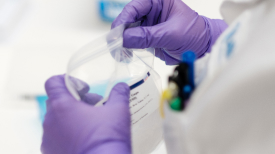- Cancer Care Team
Cancer Care Team
To deliver optimal patient outcomesProducts and Services
Cancer Type
Supplies & Tools
Scientific Focus
- Biopharma Partners
- Patients
- Education & Events
- Login
- Contact Us
Test Details
 Cancer Type
Cancer Type
Acute myelocytic leukemia (AML), Hematologic malignancies, Leukemia
 Technology Used
Technology Used
Molecular
 Turnaround Time
Turnaround Time
10 - 14 days
Use
c-KIT is a proto-oncogene that encodes a type III transmembrane tyrosine kinase. c-KIT and its ligand stem cell factor have a key role in survival, proliferation, differentiation and functional activation of hematopoietic progenitor cells. c-KIT mutations are reported in the majority of systemic mastocytosis cases. For KIT D816V mutation analysis by high sensitivity digital PCR, please see test KIT D816V Digital PCR. c-KIT mutations account for 20% to 40% in core-binding factor (CBF) acute myeloid leukemia (AML). c-KIT mutations also occur in MDS and contribute to MDS risk stratification. c-KIT mutation in AML confers increased risk of relapse and decreased overall survival. Tyrosine kinase inhibitors, such as imatinib and avapritinib, have been evaluated to treat systemic mastocytosis. Imatinib has also been evaluated to treat c-KIT-positive AML and MDS, and it was found effective as a single reagent or combination therapy.
Special Instructions
Please direct any questions regarding this test to oncology customer service at 800-345-4363.
Limitations
Genomic DNA was purified from the provided specimen. Exons 8 and 17 of c-KIT gene coding were subjected to PCR amplification and bidirectional sequencing in duplicate to identify sequence variations. This assay has a sensitivity to detect approximately 10% population of cells containing the c-KIT mutations in a background of nonmutant cells. This assay will not detect the mutation below the sensitivity of the assay. Molecular-based testing is highly accurate but, as in any laboratory test, rare diagnostic errors may occur.
This test was developed and its performance characteristics determined by Labcorp. It has not been cleared or approved by the Food and Drug Administration.
Methodology
Polymerase chain reaction (PCR) and DNA sequencing
Specimen Requirements
Information on collection, storage, and volume
Specimen
Whole blood or bone marrow
Volume
3 to 5 mL whole blood or 1 to 2 mL bone marrow
Minimum Volume
3 mL whole blood or 1 mL bone marrow
Container
Lavender-top (EDTA) tube, green-top (sodium heparin) tube, tan-top (K2-EDTA) tube or pink-top (K2-EDTA) tube
Storage Instructions
Ship at room temperature; if specimen is stored prior to shipment, store at 2°C to 8°C.
Causes for Rejection
Specimen does not meet all of the above criteria for sample type, container, minimum volume, collection and storage; unsuitable specimens include but are not limited to: frozen whole blood or marrow; a leaking tube; clotted blood or marrow; a grossly hemolyzed specimen or otherwise visibly degraded; specimen suspected of being contaminated by another specimen; specimen contains specific foreign material
Collection
Submit at room temperature. Indicate date and time of collection on the test request form.
Related Tests
Find more tests related to this one.





